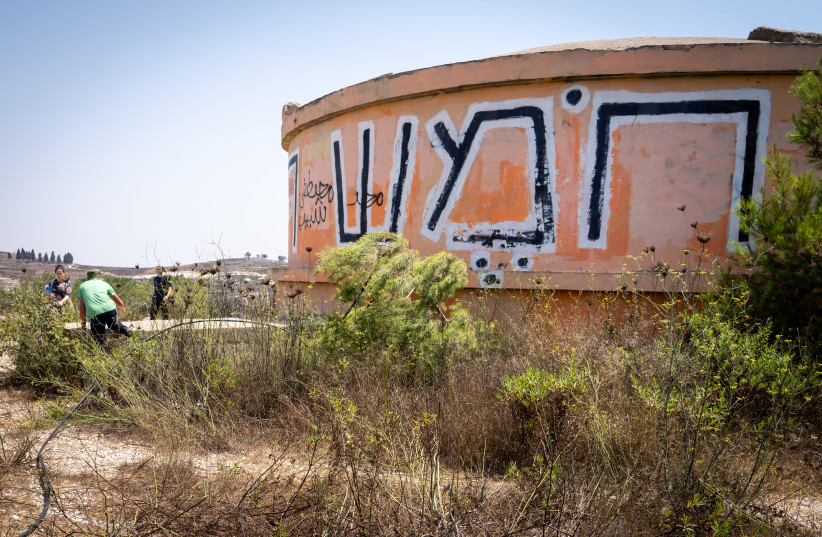Bill to cancel north Samaria disengagement heads to first Knesset reading

The original Disengagement Bill from 2005 included a clause that bars Israeli citizens from reentering any of the evacuated areas.
A bill to enable Israeli citizens to travel to the northern Samaria area that was evacuated in the 2005 Disengagement was approved by the Knesset Foreign Affairs and Defense Committee on Thursday, and could pass its first reading on the Knesset floor next week.
MK Ze’ev Elkin, a member of the opposition, voted in favor of the bill.
The original Disengagement Bill from 2005 included a clause that bars Israeli citizens from reentering any of the evacuated areas. The current bill is an amendment that would erase this clause regarding northern Samaria, thus equating the area’s status to that of the rest of the West Bank.
The vote passed 9-4, with all of the coalition’s MKs voting in favor, and the opposition MKs save for Elkin – Yesh Atid’s Ram Ben Barak and Moshe Turpaz, National Unity’s Gadi Eisenkot and Labor’s Gilad Kariv – voting against.
“On the most personal level, I also bear responsibility for the Disengagement,” committee chairman Likud MK Yuli Edelstein said at the end of the debate that preceded the vote.
“I knew from the first moment what would happen. I fought – we even managed to convince Likud Party members – but we were not able to convince the public,” he said.
Samaria Regional Council head Yossi Dagan, visibly emotional, read the chapter in the Book of Ezekiel known as “The Valley of Dry Bones,” which describes the resurrection of the people of Israel at the End of Days.
Eisenkot argued that the law was largely a tactical move and not strategically important, and as such, it was unwise to pass it at a time of heightened security tension between Israel and the Palestinians.
Special Knesset committee to advance Incapacity Bill
In other Knesset news on Thursday, the special committee that was formed in order to pass two amendments to Basic Laws convened to continue its debate on one of them, known as the “Incapacity Bill.” The bill’s purpose is to limit the ability of Israel’s attorney-general to announce a prime minister “incapacitated” to cases in which the leader is “physically or mentally” incapable of fulfilling his role.
The bill is the coalition’s response to the High Court of Justice’s refusal to reject out of hand an appeal by the Movement of Quality Government in Israel that would require Attorney-General Gali Baharav-Miara to declare Prime Minister Benjamin Netanyahu incapable of serving in the position, due to conflicts of interest between the government’s proposed judicial reforms and his ongoing criminal trials.
The new bill would remove the attorney-general’s authority to make such a declaration, and therefore make the appeal irrelevant.
“The deeper we delve into what happens in the world, we discover that there is a legal start-up in Israel, which would enable the removal of a prime minister for reasons that are not medical,” Katz said during the discussion.
“In no other place in the world, no matter what regime, does a legal official have the ability to announce the prime minister incapacitated,” he said. “Such a move is simply to harm democracy, reject the outcome of the election and launch a coup d’état by the court.”
Yesh Atid MK Orna Barbivay countered: “What is the meaning of the Incapacity Bill other than to enable corruption? The bill’s purpose is to block the option to appeal against a prime minister, since every crime will be immune to law. I do not trust a prime minister with three criminal cases, who sends the justice minister and Knesset Constitution Committee chairman to weaken the judicial system.”
The bill passed its preliminary Knesset reading last week, and, if approved by the special committee, will head to the Knesset floor for its first reading.
Jerusalem Post Store
`; document.getElementById("linkPremium").innerHTML = cont; var divWithLink = document.getElementById("premium-link"); if (divWithLink !== null && divWithLink !== 'undefined') { divWithLink.style.border = "solid 1px #cb0f3e"; divWithLink.style.textAlign = "center"; divWithLink.style.marginBottom = "15px"; divWithLink.style.marginTop = "15px"; divWithLink.style.width = "100%"; divWithLink.style.backgroundColor = "#122952"; divWithLink.style.color = "#ffffff"; divWithLink.style.lineHeight = "1.5"; } } (function (v, i) { });

